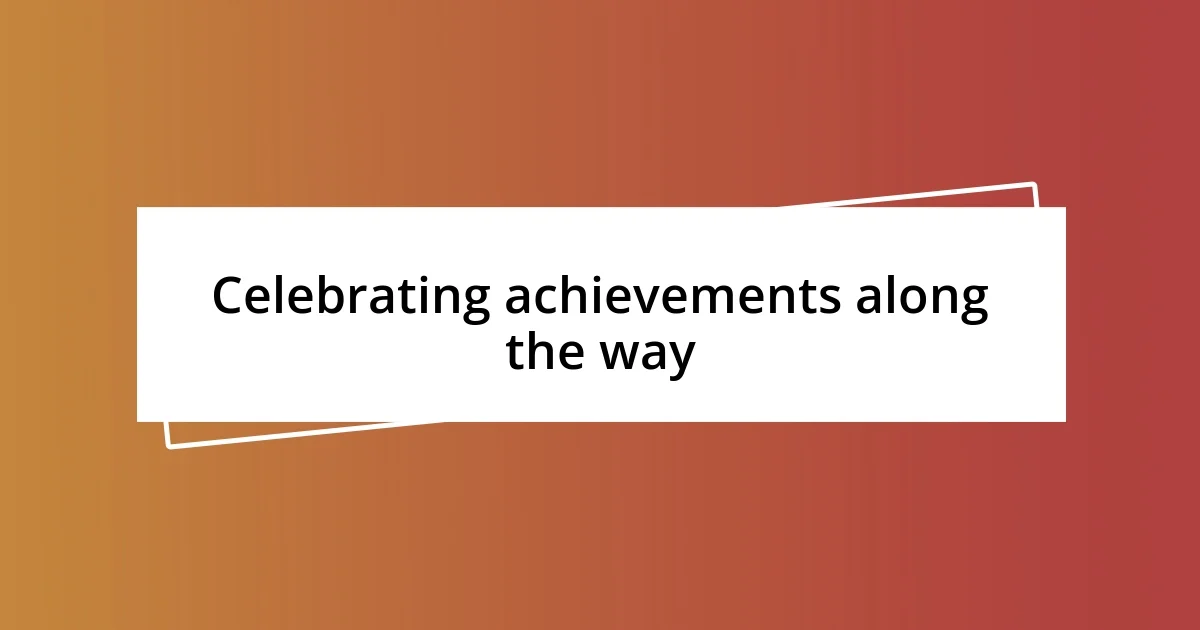Key takeaways:
- Personal best goals focus on self-improvement and personal fulfillment rather than external validation, fostering a deeper sense of joy and progress.
- Setting realistic benchmarks and developing a structured plan enhances motivation and accountability, making daunting goals more achievable.
- Celebrating small achievements and maintaining motivation through vision boards and supportive relationships play crucial roles in sustaining long-term commitment to personal goals.

Understanding personal best goals
Understanding personal best goals is about recognizing what truly matters to you. I remember when I first set a personal best goal; it wasn’t about beating someone else—it was about challenging myself. Have you ever felt that exhilarating moment when you realize surpassing your own limits is what brings you joy?
These goals are deeply personal, often tied to our passions and values. I once aimed to run a half-marathon, fueled not just by the distance, but by the personal journey each mile represented. It was a mix of sweat, determination, and the sheer thrill of testing my capabilities. What if we viewed our goals as milestones of personal growth rather than mere achievements?
When I finally achieved my goal, the sense of fulfillment was more profound than victory itself. It made me wonder, how often do we focus on external validations instead of the joy of our personal progress? Understanding personal best goals can lead to a more meaningful journey, transforming our pursuits into reflections of who we truly are.

Setting realistic benchmarks
Setting realistic benchmarks is crucial for personal growth. I distinctly remember when I decided to set my first running benchmark. Instead of aiming for an unrealistic pace, I focused on improving my mile time by just 10 seconds each week. This small, attainable target felt much more manageable and not overwhelming, allowing me to celebrate those incremental victories.
Moreover, breaking down larger goals into smaller benchmarks can help sustain motivation. I once wanted to finish a tough obstacle course race, but the training seemed daunting. So, I started by focusing on mastering just one obstacle at a time. This step-by-step approach not only made the process less intimidating but also built my confidence with each conquered challenge.
By setting these realistic benchmarks, I learned to appreciate the journey itself rather than only fixating on the end goal. It’s like when I chose to focus on enjoying my runs instead of just tracking my speed. Each training session became a triumph, fueling my passion and commitment to pushing my limits even further.
| Benchmark Type | Description |
|---|---|
| Short-term | Aim for easily achievable targets within a few days or weeks. |
| Mid-term | Goals that can be accomplished in a few months, like improving fitness levels. |
| Long-term | Broader goals, such as completing a marathon, often requiring sustained commitment. |

Developing a structured plan
Developing a structured plan is essential for translating personal best goals into actionable steps. I recall vividly the moment I decided to create a training schedule for my first triathlon. It was daunting to think about swimming, biking, and running—all in one day. However, breaking it down into manageable daily tasks transformed my anxiety into excitement. Each completed workout felt like a small victory, reinforcing my commitment to the overall goal.
When creating a structured plan, consider these key components:
- Identify your goal: Clearly define what your personal best will look like.
- Break it down: Segment your goal into actionable steps—one week at a time or even one day at a time.
- Set a timeline: Map out when you want to achieve each step to stay focused.
- Track your progress: Maintain a journal or app to record your achievements, setbacks, and learning experiences.
- Adjust as needed: Be flexible; if something isn’t working, revisit your plan and make necessary changes.
These elements not only lend clarity to your journey but also help to build a sense of accountability. I remember feeling a rush of empowerment every time I checked an item off my list. It’s not just about the destination; it’s about enjoying the path you carve out for yourself along the way.

Overcoming obstacles and setbacks
Overcoming obstacles often feels like a mountain to climb, and I’ve faced my share of setbacks. I recall a period during my training for a half marathon when an unexpected injury sidelined me for weeks. Instead of retreating into frustration, I decided to focus on what I could control—my nutrition and mental preparation. That shift in mindset not only kept my spirits up, but it also taught me that recovery can be a valuable part of the journey. Have you ever found ways to adapt when faced with challenges?
There were moments when the pressure to perform felt overwhelming, and self-doubt crept in like an unwelcome guest. I vividly remember the day I stumbled during a practice run and thought, “Maybe I’m not cut out for this.” Instead of spiraling into negativity, I reached out to friends who had been on similar paths. Their stories of overcoming personal hurdles reminded me that setbacks are merely stepping stones. It’s crucial to seek support; you’d be surprised how shared experiences can lighten your load.
Sometimes, the most significant obstacles come from within. I’ve had days where the voice in my head whispered that giving up might be easier than pushing through. Yet, something remarkable happens when you confront that inner critic. I started journaling my thoughts and feelings, and I discovered that recognizing and challenging that negativity transformed my outlook. One tiny step in breaking that cycle can redefine not just your training, but your entire approach to overcoming adversity. What steps can you take when that inner voice challenges your resolve?

Tracking progress effectively
Tracking progress can sometimes feel like an overwhelming task. I remember when I first started using a fitness app to log my workouts. Initially, I treated it like a chore, but when I noticed those little graphs of my improvements, it sparked joy! It became almost like a game—seeing how I could push a little harder or run a bit longer each week. Isn’t it fascinating how something as simple as tracking can completely shift motivation?
It’s important to note that progress measurement isn’t only about hitting big milestones; often, it’s the tiny victories that propel us forward. One time, I struggled to complete a specific workout that my plan called for. Instead of getting discouraged, I decided to mark my effort down anyway, celebrating the determination it took just to attempt it. I’ve found that celebrating those small victories can be a powerful motivator. What small wins have you celebrated along your journey?
I often reflect on how fundamental the act of tracking can be for accountability. On particularly tough days, I’d look back at my progress journal, reminding myself of the challenges I’ve overcome and the strides I’ve made. It became a tangible reminder that even on the days I felt stagnant, I was still moving ahead. Have you ever looked back and realized just how far you’ve come?

Celebrating achievements along the way
Celebrating achievements, no matter how small, has been a game-changer in my journey. I remember crossing a particularly hard-fought milestone—a new personal record in my running time. Instead of quietly moving on to the next goal, I invited my friends over for a little celebration. We shared pizza, laughs, and my favorite part—reminiscing about all the struggles that led to that moment. How often do we take the time to truly appreciate our victories in the hustle of training?
There’s something profound about taking a moment to pause rather than rush into the next challenge. After completing a tough week of workouts, I set aside an evening just for reflection. I crafted a small vision board, filling it with photos from my progress and reminders of past achievements. The act of piecing it together filled me with pride, and it was a beautiful reminder of why I started this journey. Have you ever created something that visually encapsulated your growth?
Every little celebration amplifies the joy of the journey. I vividly recall the day I ran my first uninterrupted mile; I felt like I had conquered the world. Instead of glossing over it, I treated myself to a spa day! It was an extravagant gesture, but it reinstated my belief in rewarding effort. Recognizing achievements is so important—how do you choose to celebrate your milestones?

Maintaining motivation for future goals
Maintaining motivation for future goals can be a journey filled with ups and downs. I recall a time when the excitement of my initial progress began to fade, leaving me questioning my next steps. To reignite that spark, I started making monthly vision boards—each one reflecting my evolving dreams and where I wanted to go next. Have you ever visualized your goals in such a tangible way? It truly helps to keep them front and center in my mind.
Sometimes, I find that writing down not just my goals but also the reasons behind them provides a powerful boost. After when I drafted a list of “why’s” for my aspirations, it became a mantra I could recite on tough days. Whenever doubts creep in, I remind myself why I began this journey in the first place. Isn’t it fascinating how revisiting your motivations can breathe new life into your ambitions?
Keeping the fire alive also involves surrounding myself with positive influences. I deliberately choose to connect with like-minded individuals who inspire me. Those coffee chats where we share our wins and frustrations often leave me energized and motivated. Have you thought about how your circle impacts your journey? Relationships can be an extraordinary source of encouragement!














